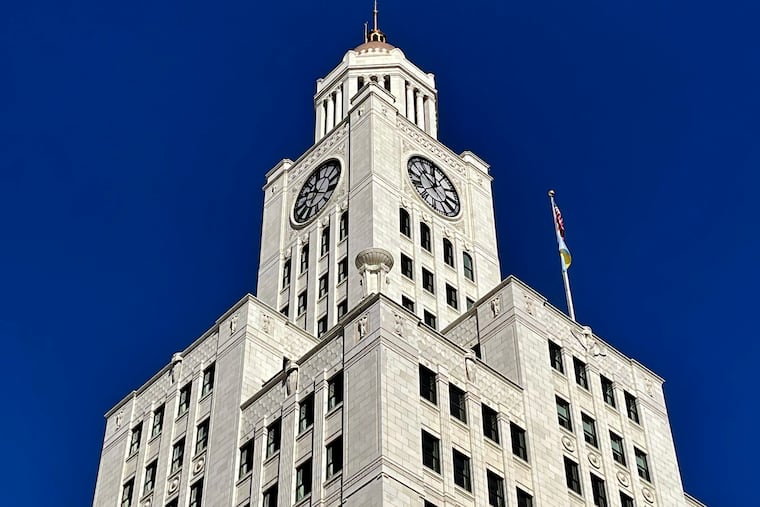Hundreds of Philly police officers work administrative jobs that could be done by civilians, a study found
Mail delivery, data entry, and human resources are among the jobs being performed by sworn officers that in many other cities are done by civilians.

Nearly 900 positions within the Philadelphia Police Department that are currently held by sworn police officers could be filled by civilians, according to researchers at the University of Pennsylvania who last year studied the department’s makeup.
The review, which the city authorized in 2020, found that these officers perform duties that in other cities are done by civilians, who typically earn less, have no arrest power, and don’t carry firearms.
Researchers found that hundreds of sworn officers primarily work at front desks, perform data entry, or issue permits. Dozens are court liaisons, office managers, or human-resources officials. Six transport mail between police districts. Eight manage graphic design work, and a handful are grant writers.
In total, about 11% of Philadelphia’s 7,000-employee department are civilians, the researchers found. That’s fewer than in most large departments — civilians make up nearly a quarter of total staff among agencies nationwide that serve jurisdictions with more than 1 million people.
The study authors presented their findings to top police brass, including Commissioner Danielle Outlaw, in August 2021. They contended in the report that “civilianizing” parts of the force could result in a more diverse department with improved efficiency and productivity. There could be cost savings through payroll reductions, they said, though they didn’t specify a dollar amount.
» READ MORE: How Philly will spend nearly a billion dollars on policing and violence prevention
The city, which touted its partnership with Penn as a reform effort after the Minneapolis police killing of George Floyd, did not pay for the 75-page study, but researchers conducted dozens of interviews with officers, commanders, and civilian staff.
City officials also did not publish the study, which was obtained by The Inquirer through a Right-to-Know request. The lead study author declined to comment, citing a nondisclosure agreement.
While a large-scale restructuring is unlikely in the short-term, the review is guiding potential changes, including a push to hire civilians to fill some district-level administrative roles as the force faces a historic staffing shortage, with more than 500 officer vacancies.
Changes to the number of police officers or their duties generally need to be collectively bargained. Department spokesperson Sgt. Eric Gripp said officials participated in an August hearing with the Fraternal Order of Police Lodge 5, the union that represents Philadelphia police officers, and expect a ruling this month. The union declined to comment Monday.
Outlaw has expressed support for civilianizing some roles, saying during a spring budget hearing before City Council that she has particular concerns about police officers in administrative positions or delivering mail.
“I consider our staffing issue a crisis,” she said, “and we have to do everything we can internally to see that we’re being as efficient as possible.”
Staffing tweaks are in the works
The potential shift comes amid other simmering staffing reforms. The department has a small program that sends social workers to some mental-health calls alongside police. And for years, City Council President Darrell L. Clarke has pushed for the city to hire “public safety officers,” or unarmed civilians who enforce code regulations and deal with traffic flow.
» READ MORE: Following other cities, Philly will now sends specialists alongside cops to some mental health calls
Last week, after a 14-year-old was fatally shot leaving a football scrimmage, Clarke directly tied implementing the plan to the city’s ability to fight gun violence, saying the money for has been “sitting in the budget for the last four years.”
“We can get police, stop them from doing traffic, stop them from delivering mail, stop them from writing abandoned car tickets, stop them from sitting on construction sites with their light on,” he said, “[and] replace them with public safety officers, and get those police out on the street.”
But besides the labor disputes, there are major barriers to civilianization, and it’s unlikely the department would — or even could — transition hundreds of roles any time soon.
Civilians must be hired through the city’s civil-service process, which can take months. Applicants to those roles would be subject to a residency rule, which requires they live in the city for a year before applying. The study authors wrote that the civil-service process “severely limits” the department’s ability to recruit and hire qualified candidates.
They also found that the department doesn’t define many roles held by police officers, and doesn’t systematically track which function officers are assigned to. For example, they wrote, most department staff members know that captains have an officer “aide” who serves as their chief of staff and driver, but there’s no documentation the role exists.
‘Not just some bureaucratic organization’
And the biggest challenges to overcome may be cultural. While “civilianization” has been around for decades, it’s been associated over the last several years with the police reform and defunding movement.
Beyond cost savings, some proponents see it as a way to reduce the number of officers, thereby cutting down on the amount of potential interactions people have with uniformed police.
There’s disagreement over what the effect might be. Maria “Maki” Haberfeld, a professor of police science and department chair at John Jay College, said she sees civilianization efforts as “about saving money, but not about creating a better police department.”
She said police officers handle administrative roles like record-keeping because they’re trained in crime codes and documentation. And she pointed out that hiring standards are generally lower for civilians, who don’t need to pass a battery of tests and train at the police academy for nine months.
“It’s not just some bureaucratic organization where if you file something in the wrong place it’s not a big deal,” she said. “People’s lives are dependent upon this bureaucracy.”
Inquirer staff writer Sean Collins Walsh contributed reporting.